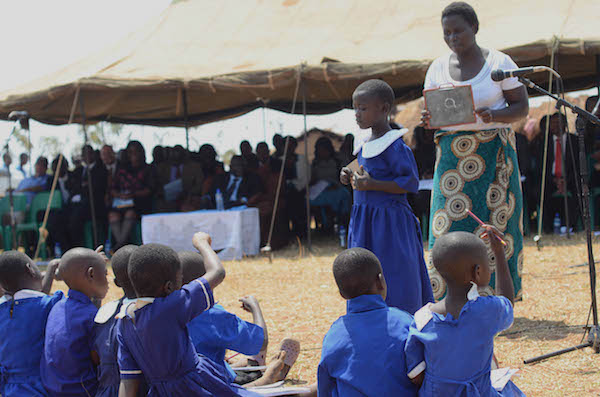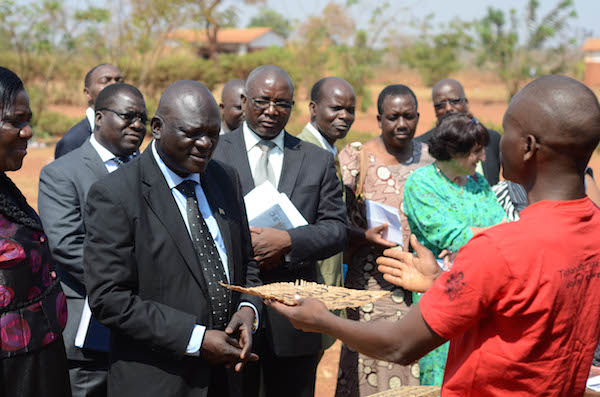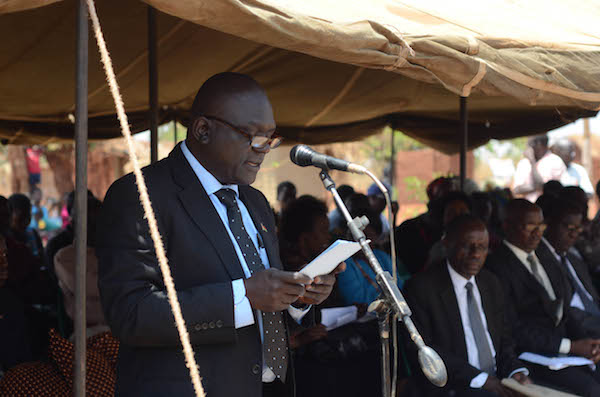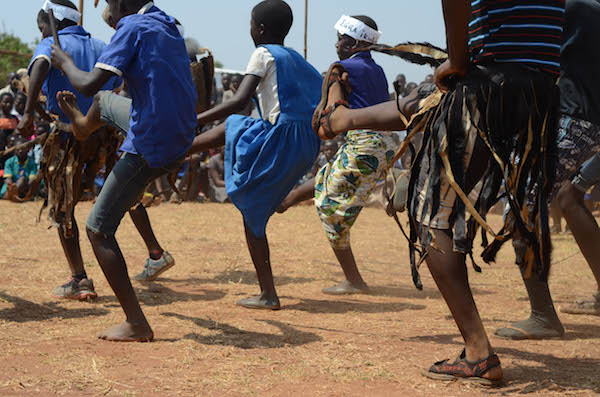Literacy Boost and Tiwerenge Ndi Ana Athu (TiANA) Early Grade Reading Innovations Spice Malawi’s International Literacy Commemoration Day Celebrations
Today, the grounds of Pheleni Primary School, in Lilongwe Rural were filled with colour and pomp on the World Literacy Day Commemoration thanks in part to the collaborative Save the Children and USAID project, Tiwerenge ndi Ana Athu (TiANA). TiANA is a project funded by USAIDs All Children Reading Grand Challenge, which supports and helps improve Save the Children’s, Literacy Boost Initiative – an evidence based response to an alarming global trend—the rise in the numbers of children finishing primary school who are unable to read well enough to learn.
The commemoration follows UNESCO’s declaration of 17th November 1965 where countries are urged to celebrate this day as a means to promote and highlight the importance of literacy to individuals and the nation. The global theme for this year’s commemoration is: Literacy and Sustainable Development. The Ministry of Education, Science and Technology’s (MoEST) main objective of the event was to showcase the range of good practices currently being implemented by various partners and the multiple roles that communities play to improve reading in early grades.

Roughly 46 per cent of Malawi’s population of 16 million is under the age of 15. According to the 2010/2011 Integrated Household Survey – 81% of children aged 6-9 years old and 91% of children aged 10-13 are illiterate. Put those figures into perspective coupled with the expected doubling of the country’s population in 2033 and you would see that Malawi’s developmental state for the next generation is in great danger if nothing is to be done.
Recent macro development policy tools like the Malawi Growth and Development Strategies (MGDS), National Education Sector Plan (NESP) and a recently drafted National Reading Strategy have inspired different stakeholders including NGOs to rally behind Government efforts to improve early grade literacy as a key to success in improving learning outcomes and ultimate national socio-economic development. Save the Children’s role along with the other NGOs has been to support the government to achieve its plans and targets.
In 2009, Save the Children commenced a pilot on Literacy Boost – an evidence driven initiative focusing on continuous professional development of teachers on the teaching of the five core elements in reading, capacity building of community members to support the teaching of reading in schools and practice of reading in community camps and generation of data through annual baseline and endline assessments. Almost at the same time USAID through Research Triangle Institue (RTI) introduced and later expanded funding to Malawi’s Government on Early Grade Reading Assessment culminating into Early Grade Reading Activities in 2013. Following Save the Children and USAID, World Vision International (WVI), Theatre for Change (TFC) and Volunteer Service Overseas (VSO) joined the scene with various innovations.
Malawi’s official celebration of the International Literacy Day on 24th September, presented an opportunity for the various partners to display and present the innovations they are implementing to improve literacy in Malawi. It was a well-attended and organised event that effectively managed to communicate the reason for the celebration through pavilions by USAID, VSO and Save the Children, dance, student reading demonstrations and a theatrical performance by Theatre for a Change.
The Deputy Minister of Education, Science and Technology, Mr. Vincent Ghambi and his Ministry graced the event with their presence and also shared some encouraging words after viewing the different displays and performances.

Save the Children’s pavilion presented community members who support Literacy Boost and TiANA projects in mobilising children for attendance, production of teaching and learning materials from locally available resources, counselling girls and supporting vulnerable children using income generated from Village Savings and Loans attached to community reading camps. Save the Children also showcased a reading camp in session being facilitated by volunteer Camp Leaders.

In his speech, the Guest of Honour, the Deputy Minister, Honourable Vincent Ghambi, tremendously appreciated the efforts of different stakeholders towards improving literacy. Amongst other encouraging points, he touched on the Ministry’s commitment to improving the literacy of students and teachers by incorporating lessons and best practices learned from the work of the different partners echoing the experience undergone during the development process of the National Reading Strategy, which is yet to be launched by the Government. “We have learnt a lot from the projects implemented by government and various development partners and the lessons have guided our efforts in improving the way our children are taught literacy in school,” he said.
It is nationally clear that Save the Children’s Literacy Boost initiative has contributed significantly towards the development of the National Reading Strategy. In explaining the initiative to the media, the Senior Manager for Education, Lexon Ndalama said, “we are teaching children in a manner that fast tracks the acquisition of reading skills through sharpening teachers’ skills in teaching reading, building capacity of community members in supporting the teaching and learning of reading and comprehensive analyses of teaching, learning and community support data to drive the improvement agenda.”

The event managed to convey an important message on improving the teaching of reading, which was that improving literacy is the type of work that needs to be participatory, involving society as a whole. This was evident through the information sharing of NGOs, the government’s reminder of its commitment towards literacy, the involvement of children and teachers and a display through drama – that parents and caregivers have a role to play in improving their children’s literacy.
The Deputy Minister Honourable Vincent Ghambi (MP) successfully used findings from the Integrated Household Survey to convince the audience that the school age literacy situation in Malawi is close to a crisis that requires urgent and concerted effort to resolve. The crowd left with a sense of optimism that though the situation is grave, it is possible to reverse it if all people work together and it is a must that this be done as it also ensures socio-economic development for the country!
It is noteworthy also that while the Ministry of Gender has been commemorating the literacy day with focus on adult literacy in the past, for the Ministry of Education, Science and Technology’s, this year’s commemoration marks its first, demonstrating Government’s commitment on improving school age literacy programmes.
Written by Luzayo Nyirongo, Strategic Communications Officer
Edited by Lexon Ndalama, Senior Manager – Education & Margaret Masamba, Programme Manager – Basic Education
 Malawi
Malawi